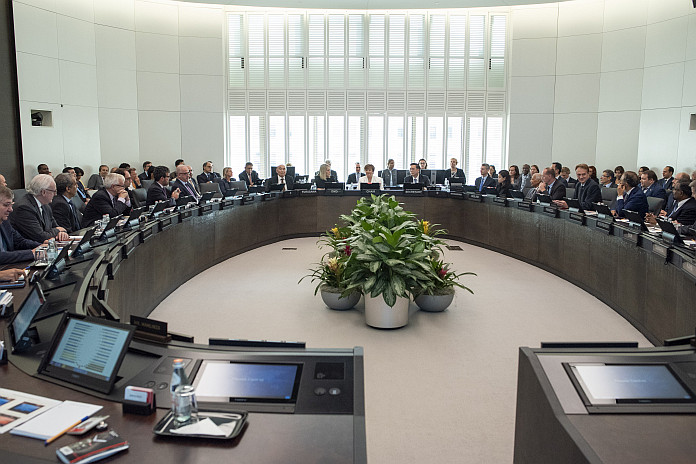- The WAEMU’s post-Covid-19 recovery has withstood the new global and regional shocks, partly due to supportive macroeconomic policies and favorable initial macroeconomic conditions. Growth prospects remain favorable and the financial system appears resilient.
- However, the WAEMU faces important risks and challenges associated with rising inflation, more limited access to international capital markets, eroding external reserve buffers, and regional security issues, in the presence of elevated global risks.
- It is urgent to design a credible fiscal strategy anchoring debt sustainability, based on clear and adequate deficit and debt regional ceilings. Further monetary tightening seems warranted unless large risks that second-round effects may derail inflation dissipate.
WASHINGTON, USA – On February 1, 2023, the executive board of the International Monetary Fund (IMF) concluded the 2022 discussions on common policies of member countries of the West African Economic and Monetary Union (WAEMU).
The WAEMU’s post-Covid-19 recovery has been moderately affected by the new global and regional shocks partly due to a further delay in fiscal adjustment. In 2022, growth is estimated to have reached 5½ percent, inflation averaged 7.5 percent mainly due to higher local and global food prices, and external reserves declined by about 20 percent to reach the equivalent of 4.5 months of imports. Against this background, monetary policy changed course through three consecutive rate hikes of 25 basis points in 2022.
Growth is expected to rebound to about 6 percent over the medium term, including due to the coming on stream of new hydrocarbon production and inflation is projected to return to the BCEAO’s target band by the end-2024. A gradual fiscal consolidation should start in 2023 and bring the aggregate fiscal deficit to 3 percent of GDP by 2025 at the latest. There are however significant downside risks to the outlook, particularly given the volatile global economic and financial outlook, as well as regional security risks and political uncertainty.
Executive board assessment
The views expressed by executive directors [today] will form part of the Article IV consultations with individual member countries that take place until the next Board discussion of WAEMU common policies that will be held on the 12-month cycle in accordance with the executive board decision on the modalities for surveillance over WAEMU policies.
Executive directors agreed with the thrust of the staff appraisal. They noted the WAEMU’s economy has shown resilience to global shocks, with supportive policies and a favorable initial macroeconomic environment helping the recovery. However, fiscal and external positions weakened, and inflationary pressures intensified. Directors cautioned that, while economic prospects remain favorable in the medium term, risks are tilted to the downside, particularly from volatile global economic and financial conditions, regional security issues and political uncertainty. They stressed the importance of a prudent fiscal and monetary policy mix and structural reforms to maintain macroeconomic and financial stability and foster inclusive growth.
Directors urged the authorities to reintroduce the regional fiscal rules and adopt a credible medium-term fiscal framework to ensure fiscal sustainability and preserve external viability. They considered that any justifiable delay of the envisaged convergence of fiscal deficits to 3 percent of GDP in 2024 should be limited to one year and supported by reasonable financing expectations. Directors emphasized that it will be critical to enhance domestic revenue mobilization and public financial management and control stock-flow adjustment operations to preserve debt sustainability while protecting priority spending.
Directors called on the authorities to stand ready to further tighten monetary policy as needed to contain inflationary pressures and, together with tighter fiscal policies, help strengthen external reserve adequacy.
Directors noted the financial system remains broadly sound but is subject to risks from the increased exposure of some banks to sovereigns and refinancing from the BCEAO. They emphasized the importance of efforts to finalize the operationalization of the bank resolution framework, introduce “targeted” Pillar 2 capital surcharges and liquidity requirements, enhance supervisory independence, and implement an emergency liquidity assistance scheme. Directors concurred that enhancing the depth and liquidity of the sovereign security market remained a priority. They encouraged the authorities to enhance AML/CFT supervision and assess climate-related risks in the financial sector in line with the 2022 FSAP recommendations.
Directors agreed that WAEMU member countries growth prospects would benefit from more robust structural reforms, regional trade integration, and greater coordination and pooled resources to implement regional development projects, particularly in the areas of energy, digital and physical infrastructure, and food resilience.
The views expressed by executive directors today will form part of the Article IV consultations with individual member countries that take place until the next board discussion of WAEMU common policies. It is expected that the next regional consultation with the WAEMU will be held on the standard 12-month cycle.





